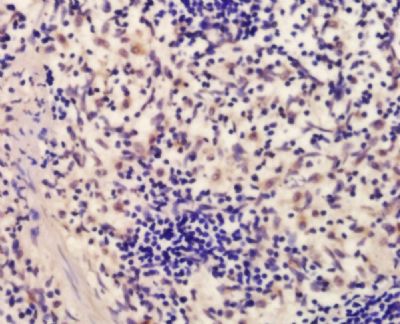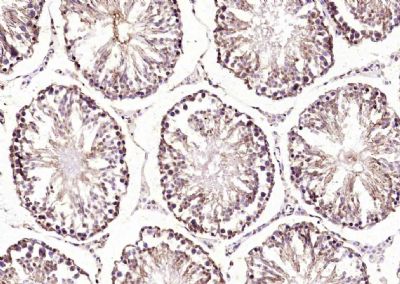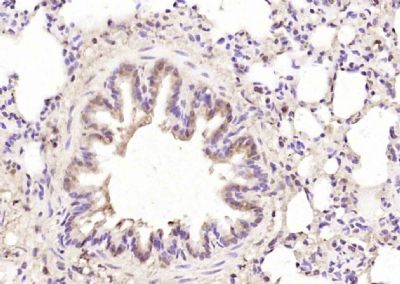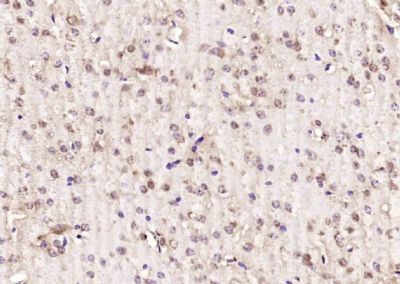eIF4ENIF1 Polyclonal Antibody
Purified Rabbit Polyclonal Antibody (Pab)
- SPECIFICATION
- CITATIONS
- PROTOCOLS
- BACKGROUND

Application
| IHC-P, IHC-F, IF, ICC, E |
|---|---|
| Primary Accession | Q9NRA8 |
| Reactivity | Rat, Pig, Chimpanzee, Bovine |
| Host | Rabbit |
| Clonality | Polyclonal |
| Calculated MW | 108 KDa |
| Physical State | Liquid |
| Immunogen | KLH conjugated synthetic peptide derived from human eIF4ENIF1 |
| Epitope Specificity | 51-150/985 |
| Isotype | IgG |
| Purity | affinity purified by Protein A |
| Buffer | 0.01M TBS (pH7.4) with 1% BSA, 0.02% Proclin300 and 50% Glycerol. |
| SUBCELLULAR LOCATION | Cytoplasm. Nucleus. Predominantly cytoplasmic. Shuttles between the nucleus and the cytoplasm in a CRM1-dependent manner. |
| Important Note | This product as supplied is intended for research use only, not for use in human, therapeutic or diagnostic applications. |
| Background Descriptions | The protein encoded by this gene is a nucleocytoplasmic shuttle protein for the translation initiation factor eIF4E. This shuttle protein interacts with the importin alpha-beta complex to mediate nuclear import of eIF4E. It is predominantly cytoplasmic; its own nuclear import is regulated by a nuclear localization signal and nuclear export signals. Multiple transcript variants encoding different isoforms have been found for this gene. [provided by RefSeq, Aug 2009] |
| Gene ID | 56478 |
|---|---|
| Other Names | Eukaryotic translation initiation factor 4E transporter, 4E-T, eIF4E transporter, Eukaryotic translation initiation factor 4E nuclear import factor 1, EIF4ENIF1 (HGNC:16687) |
| Target/Specificity | Widely expressed. |
| Dilution | IHC-P=1:100-500,IHC-F=1:100-500,ICC=1:100-500,IF=1:100-500,ELISA=1:5000-10000 |
| Storage | Store at -20 ℃ for one year. Avoid repeated freeze/thaw cycles. When reconstituted in sterile pH 7.4 0.01M PBS or diluent of antibody the antibody is stable for at least two weeks at 2-4 ℃. |
| Name | EIF4ENIF1 (HGNC:16687) |
|---|---|
| Function | EIF4E-binding protein that regulates translation and stability of mRNAs in processing bodies (P-bodies) (PubMed:16157702, PubMed:24335285, PubMed:27342281, PubMed:32354837). Plays a key role in P-bodies to coordinate the storage of translationally inactive mRNAs in the cytoplasm and prevent their degradation (PubMed:24335285, PubMed:32354837). Acts as a binding platform for multiple RNA-binding proteins: promotes deadenylation of mRNAs via its interaction with the CCR4-NOT complex, and blocks decapping via interaction with eIF4E (EIF4E and EIF4E2), thereby protecting deadenylated and repressed mRNAs from degradation (PubMed:27342281, PubMed:32354837). Component of a multiprotein complex that sequesters and represses translation of proneurogenic factors during neurogenesis (By similarity). Promotes miRNA-mediated translational repression (PubMed:24335285, PubMed:27342281, PubMed:28487484). Required for the formation of P- bodies (PubMed:16157702, PubMed:22966201, PubMed:27342281, PubMed:32354837). Involved in mRNA translational repression mediated by the miRNA effector TNRC6B by protecting TNRC6B-targeted mRNAs from decapping and subsequent decay (PubMed:32354837). Also acts as a nucleoplasmic shuttling protein, which mediates the nuclear import of EIF4E and DDX6 by a piggy-back mechanism (PubMed:10856257, PubMed:28216671). |
| Cellular Location | Cytoplasm, P-body. Cytoplasm. Nucleus. Nucleus, PML body. Nucleus speckle. Note=Predominantly cytoplasmic (PubMed:10856257). Mainly localizes to processing bodies (P-bodies) (PubMed:16157702). Shuttles between the nucleus and the cytoplasm in a CRM1-dependent manner (PubMed:10856257). Localization to nuclear foci and speckles requires active transcription (PubMed:22090346) |
| Tissue Location | Widely expressed.. |

Thousands of laboratories across the world have published research that depended on the performance of antibodies from Abcepta to advance their research. Check out links to articles that cite our products in major peer-reviewed journals, organized by research category.
info@abcepta.com, and receive a free "I Love Antibodies" mug.
Provided below are standard protocols that you may find useful for product applications.
If you have used an Abcepta product and would like to share how it has performed, please click on the "Submit Review" button and provide the requested information. Our staff will examine and post your review and contact you if needed.
If you have any additional inquiries please email technical services at tech@abcepta.com.













 Foundational characteristics of cancer include proliferation, angiogenesis, migration, evasion of apoptosis, and cellular immortality. Find key markers for these cellular processes and antibodies to detect them.
Foundational characteristics of cancer include proliferation, angiogenesis, migration, evasion of apoptosis, and cellular immortality. Find key markers for these cellular processes and antibodies to detect them. The SUMOplot™ Analysis Program predicts and scores sumoylation sites in your protein. SUMOylation is a post-translational modification involved in various cellular processes, such as nuclear-cytosolic transport, transcriptional regulation, apoptosis, protein stability, response to stress, and progression through the cell cycle.
The SUMOplot™ Analysis Program predicts and scores sumoylation sites in your protein. SUMOylation is a post-translational modification involved in various cellular processes, such as nuclear-cytosolic transport, transcriptional regulation, apoptosis, protein stability, response to stress, and progression through the cell cycle. The Autophagy Receptor Motif Plotter predicts and scores autophagy receptor binding sites in your protein. Identifying proteins connected to this pathway is critical to understanding the role of autophagy in physiological as well as pathological processes such as development, differentiation, neurodegenerative diseases, stress, infection, and cancer.
The Autophagy Receptor Motif Plotter predicts and scores autophagy receptor binding sites in your protein. Identifying proteins connected to this pathway is critical to understanding the role of autophagy in physiological as well as pathological processes such as development, differentiation, neurodegenerative diseases, stress, infection, and cancer.





